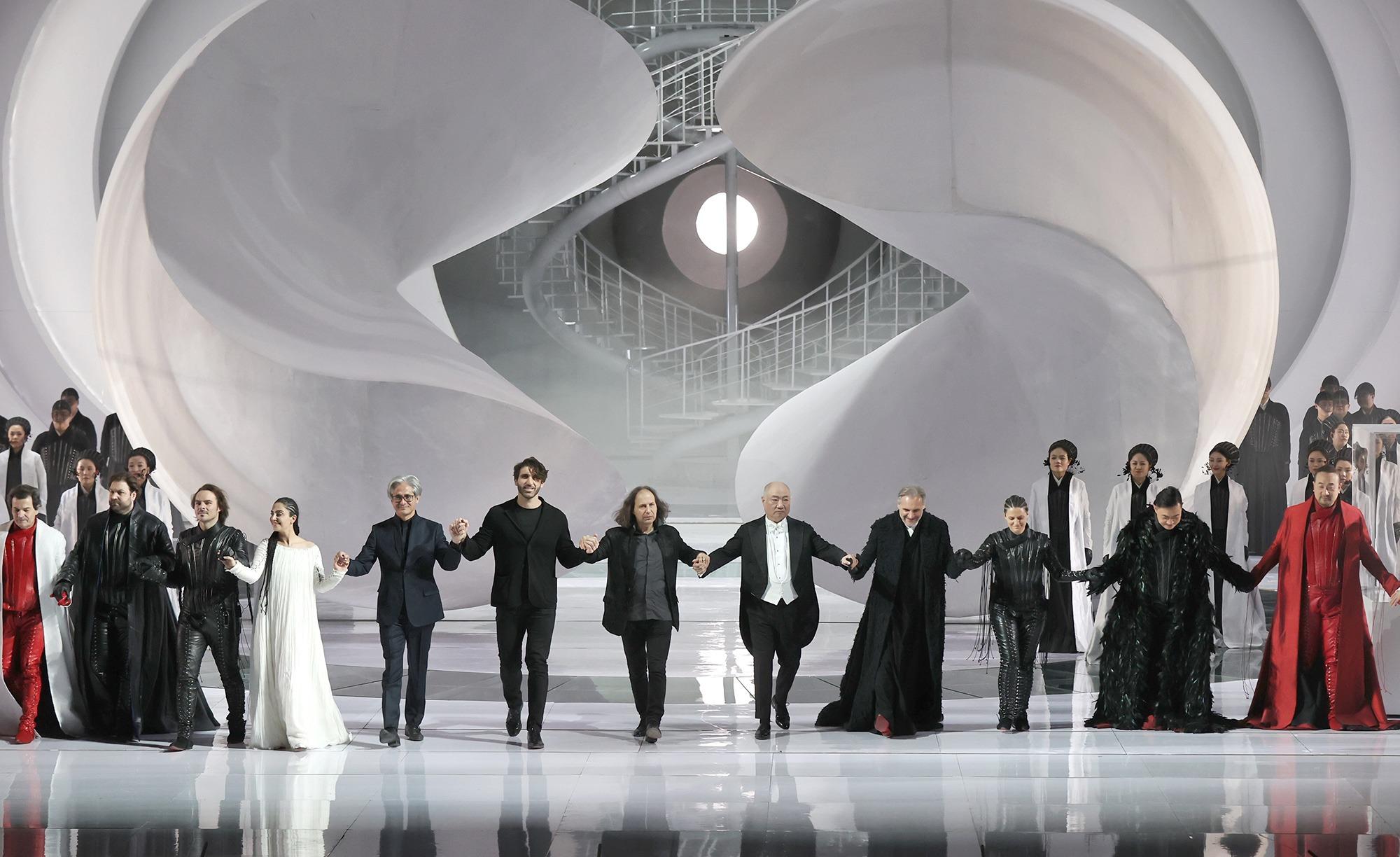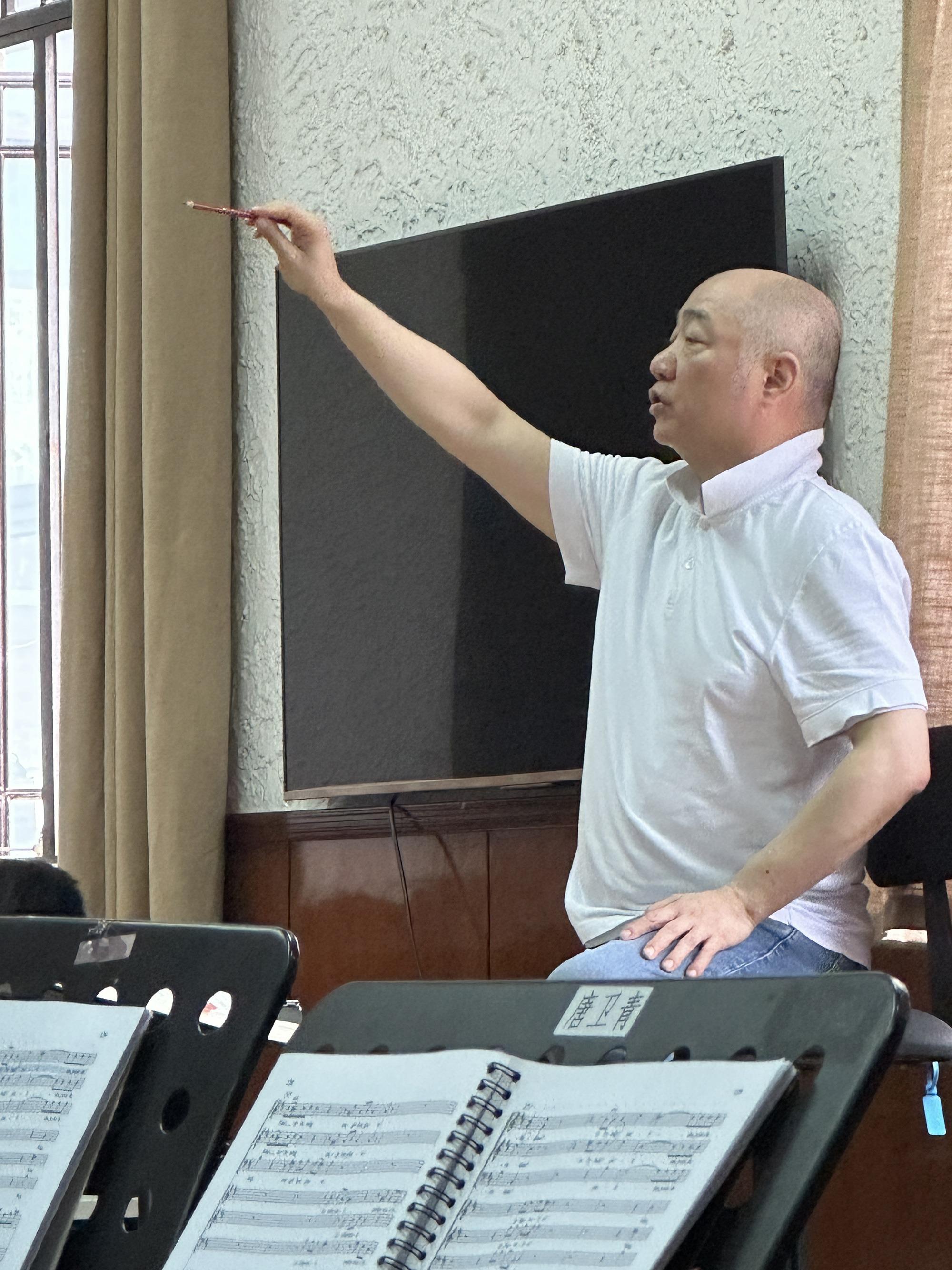In the China-France Year of Culture and Tourism, pianist-turned-conductor Xu Zhong travels down memory lane to his years as a student at the Paris Conservatory
 Conductor Xu Zhong (fifth from right), opera director Stefano Poda (left of Xu) and the actors take the curtain call after the performance of the opera Romeo and Juliette at the National Centre for the Performing Arts, Beijing, on the evening of Jan 25, 2024. The opera, created by the French composer Charles Gounod, was staged in the capital from Jan 25 to 28, marking the 60th anniversary of the establishment of diplomatic relations between China and France and celebrating the China-France Year of Culture and Tourism. (JIANG DONG / CHINA DAILY)
Conductor Xu Zhong (fifth from right), opera director Stefano Poda (left of Xu) and the actors take the curtain call after the performance of the opera Romeo and Juliette at the National Centre for the Performing Arts, Beijing, on the evening of Jan 25, 2024. The opera, created by the French composer Charles Gounod, was staged in the capital from Jan 25 to 28, marking the 60th anniversary of the establishment of diplomatic relations between China and France and celebrating the China-France Year of Culture and Tourism. (JIANG DONG / CHINA DAILY)
As this year marks the 60th anniversary of the establishment of China-France diplomatic relations, Xu Zhong, a leading Chinese conductor and president of Shanghai Opera House, cannot help but relive the time he spent and the moments he shared with his teachers, including master pianist Dominique Merlet, in France.
Xu, a pianist-turned-conductor, was born in 1968 and traveled to Paris at the age of 16 to take advanced piano lessons at the famous Conservatoire National Superieur de Musique et de Danse de Paris. Thus began his engagement with France for 18 years, highlighted by his meeting with Merlet. "During his tenure as a professor at the college … he was never late for the teaching sessions with me. He was always on time even when there was a general strike in the city."
We have seen exponential progress in artificial intelligencegenerated contents, such as the video generation engine Sora … Yet the ultimate wisdom of humanity still comes from constant selfrefinement.
Xu Zhong, a leading Chinese conductor and president of Shanghai Opera House
Merlet, born in Bordeaux, in 1938, is a regular member of the juries of the most prestigious international piano competitions, including the Chopin Competition in Warsaw.
The French currency was still the franc when Xu joined the Paris Conservatory — the euro made its debut much later. "It took two and a half francs to buy a cup of coffee. He (Merlet) always took the precise number of coins out of one of his coat pockets to pay for the coffee."
Xu said his initial music foundation was laid at the affiliated elementary and middle schools of Shanghai Conservatory of Music, one of China's leading music colleges.
The six years of systematic, rigorous training at the Paris Conservatory, especially with mentors such as Merlet, built what he calls "an absolute cornerstone" for his career as an orchestra conductor.
"One was fortunate to talk with a composer when the class was focused on his works," he said.
Xu, a high-profile conductor, has won many accolades including the posting as principal director of the Fondazione Arena di Verona in Italy and the first international chair of opera representing Asia at the Royal Welsh College of Music and Drama.
In 2022, he received the prestigious Officer of the Order of Arts and Letters from the French Ministry of Culture and Communication.
Last year, Xu held the baton for France's leading symphony orchestra, Orchestre de Paris. As a mark of gratitude, he extended an invitation to Merlet to attend his concerts. But at that moment Merlet had lost almost all his hearing. "He stopped coming to my concerts. It was so painful for me."
Xu quoted his mentor as saying, "I would be squandering the ticket you gave me if I listened to the concert with my hearing aid on while having trouble enjoying the wonderful sounds."
Another fact that disturbs Xu is that while a much younger leading pianist can now get hundreds of thousands of dollars for one single show, Merlet's earning cap is just tens of thousands of euros.
"Merlet often reminds me of another great soul, my first Chinese piano teacher, Professor Wang Yu at the Shanghai Conservatory of Music," Xu said.
Wang, a dedicated and strict piano teacher and mentor who passed away in 2010, did not take any money for teaching Xu for more than a decade; the only present he took from Xu's parents was a bowl of chicken soup.
"Can we have greater teachers than them (Merlet and Wang)?" Xu said.
 Xu Zhong during an orchestral rehearsal. (PROVIDED TO CHINA DAILY)
Xu Zhong during an orchestral rehearsal. (PROVIDED TO CHINA DAILY)
Language means confidence
France means unlimited inspiration to Xu, who is also a deputy to the National People's Congress, China's top legislature.
He speaks of a French pianist who once visited small communities in rural areas to perform classical works, prompting Xu to ask the government to build more small- and medium-sized public art spaces so ordinary people, too, could enjoy concerts.
France, he said, has helped nurture a range of outstanding Chinese artists including composer Chen Qigang, who wrote the music for the Beijing 2008 Summer Olympic Games.
France is also where Xu reunited with Chinese culture during his student days in Paris. He watched the classic Farewell My Concubine at a cinema in Avenue des Champs-Elysees.
"We should promote high-quality presentation of traditional Chinese culture," he said.
The year 2024 is also the China-France Year of Culture and Tourism.
As the first of the Beijing-based events marking the celebrations, Xu conducted the opera Romeo and Juliette, a work of French composer Charles Gounod, at the National Center for Performing Arts in January.
And on March 31, Xu conducted Romeo and Juliette again — this time a symphonie dramatique for French composer Hector Louis Berlioz. It was the first show of the China-France music special session at this year's Shanghai Spring International Music Festival.
"What a coincidence! It's my Year of Romeo and Juliette!" Xu said and burst out laughing.
"The one by Berlioz is also magnificent … It well embodies romanticism and showcases French culture."
Looking back on his journey from a pianist to a conductor and then to a specialized opera conductor, Xu said it "has been quite a long, demanding journey". He added: "For an opera conductor, you must be linguistically competent enough to convince the audience in France. Similarly, if you conduct Italian works, you should speak Italian well, which is true for German works, too."
His mastery of foreign languages such as French, German and Italian has "played a leading role" in building his confidence in Chinese culture. "You can be one of the best messengers and presenters of your own culture in Paris if you are proficient in the French language and vocalize French proverbs fluently and naturally."
Xu said he still prefers spending time reading music scores and texts in Chinese and French and taking notes at a time when many people have become addicted to smartphones, scrolling up and down their screens to watch short videos.
Urging people to return to theaters and opera houses to enjoy a masterpiece in its entirety instead of listening to short, less-than-a-minute climax of a song on their smartphones, he said: "We have seen exponential progress in artificial intelligence-generated contents, such as the video generation engine Sora … Yet the ultimate wisdom of humanity still comes from constant self-refinement."
Xu still travels across China as well as abroad for performances and meetings. He has been witnessing the blossoming of orchestras in China in contrast to the mergers and closing down of theaters in Europe and shrinking public spending on the performing arts.
Xu suggested China's judicial system host more arbitration over international business disputes related to show business.
"It was ludicrous when a foreign partner breached the contract of a show planned in China and we were asked to sue them in their home country," he said.


